|
Chickens
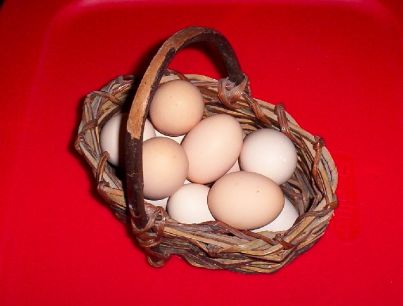
As of August 2009, we are chicken owners again.
I had Bantum Chickens as a kid. When I was growing up one of the first things I did when I first got up was to slip on my cowboy boots, still in my nightgown, and head out to feed the animals and bring in the fresh eggs. A Buff colored Bantum/Banty Chicken was the first animal I ever trained to do tricks.
As a kid I loved chickens. I think that love came from my Great Aunt Violet in Chesterfield, MO. When I was a kid I loved to go to her farm and feed her chickens, play with the chicks and collect the eggs. Of course Aunt Violet always asked if I would like for her to fix some for me. I got my first chickens from her. We also had wonderful neighbors down the street from us, the Creel's. They raised and showed all kinds of birds. They had about every breed of chickens know to man. I also enjoyed attending bird/chicken shows with the Creel's who were serious competitors as well as judges of all types of foul and exotic birds. Of course I also had chickens (and New Zealand rabbits) from their stock.
Deron had chickens on his farm in Marthasville, MO when I moved in with him. We really enjoyed the chickens and other poultry we had while living there. Deron's sister-in-law was a Kindergarten teacher and when the eggs hatched in the incubator at school, they soon came to Deron's farm. Deron's preschool sons learned early to butcher the young roosters about the time they started crowing.
Deron and I both love those "farm fresh eggs" and now we are eating/enjoying them again....and waking up to a Rooster....something my "not a morning person" husband is not looking forward to. So we are not "new to chickens", but have a lot more to learn all the same.
One of the best thing about our new chickens, three hens, a vocal Rooster, and four chicks, is that they were given to us by a really good friend of mine that lives in WI and has had chickens for years. Sally even has chicken "stuff" like cookie jars, paintings, figurines, and the like for decor in her home, mostly in the kitchen and bathroom. Sally is a good person and wonderful friend and if we have any problems with our chickens....our "go to".
The funny thing was is that while we were visiting many of our friends in WI I mentioned I was getting the chickens and four different people offered me more...if only we would have had the room, what fun it would have been.
Out here in NW SD we have many hawks and eagles. We see them all the time. So our chickens will not be free range and our pens will need "lids".
If you are buying chickens, putting up a chicken coupe, buying a good grade chicken feed and ouster shells to feed the chickens just to save money on store bought eggs....you are on the wrong track!
If you are setting up chickens because you like farm fresh eggs even though it will cost you more and will be more work to have them then store bought. Or if you bought a place that already has a chicken coupe or place in the barn for chickens. Or if you, like Deron and I, live a long way from town and do not have refrigeration, you are on the right track.
Deron and I just grin when we hear of someone that is going to raise their own chickens because the price of eggs has gone up too far. Before you buy your chickens for this reason sit down with a piece of paper and pencil and figure out what a chicken set up will cost you. Look seriously at the cost of feed, the time it will take to care properly for your chickens and what the total cost of your chicken set up (pen and coupe and nestboxes and perches) will be. Shoot, just your proper chicken waterer and feeder will cost more then several dozen eggs.
And come on, If you think you will make money selling your chicken eggs, in today's world, think again. There is no way a person can set up a small "chicken operation" and make any money. More, you will not be able to sell the eggs cheaper then the egg producers in the USA, who are government subsidized, who are set up and going, with huge operation, always raising out new hens, can sell their eggs for.
Now of course if you already have a chicken coupe and fencing up for chickens where you live that will help keep your initial costs down. If you can raise out your own chicks, this too will save money each year.
There are so many breeds and mixed breeds of chickens. Some strange, some pretty, some mean, some lay better then others, some make better mothers then others, some look as though they are missing feathers, some have "curly" feathers, different colors, different sizes, some lay white eggs, some lay brown eggs, some lay blue eggs and some lay green eggs (you serve those with ham), the list just goes on and on and on.
Some breeds are easy keepers and lay daily and some breeds need a controlled climate and do not do well when it is too hot or too cold, some are hard to keep (care for) and hard to keep right so that they do produce eggs. Remember: "Pretty is as pretty does."
If it is eggs you are looking for chose a breed that is out of what is known as the Layer Breeds. There are enough Laying Breeds to be found so that everyone can have the color and or size they are looking for. There are entire websites on the Internet set up just for chicken breeds with photos, have a look.
However, the bottom line for many, if not most of us, is to chose from what is available in your area. Most Farm Stores still offer chicks and ducklings and goslings in the Spring. Just make sure you understand full well how to care for those babies and feed them the foods they need for growing.
Whatever breed you chose, take good care of your chickens. Feed them proper foods daily and make sure they always have fresh water they can get to any time of day they chose. They count on you for their heath and safety, don't let them down. They will reward you with eggs for that good care.

There is an art to buying Laying Hens. Laying Hens were once Poullets. If you reach into that bin in the Feed Store and buy "Laying Breeds" you are also going to get Roosters. Pay more and buy the ones marked "Poullets".
Better yet, if you can find someone selling "Laying Hens" that are proven, that are already laying eggs, all the better. Know that you will pay more for the Laying Hens then for the cute little chicks but the Laying Hens will also be laying the eggs you desire.
How many hens do you need? Well, need for what? If you are only looking for 2 eggs per day, you will need less hens then the person that would like to have 12 eggs per day. Most hens will lay one egg per day during most seasons if you set up a light for them during the winter.
KEEPING YOUR NEW BOUGHT BABY CHICKS WARM AND FED You can not put those new baby chicks you just bought outdoors to fen for themselves. They are babies without their mama to look out for and keep them warm. Those babies have what is called "down", they do not have feathers yet to keep them warm and help them fly to safety.
You baby chicks need baby chick food, you can buy this, and it is not expensive, at the Feed Mill or Farm Store near you. Most places that sell baby chicks, sell the food too. Chicks also have to be kept very warm, people have found that if you keep them at 90 to 95 degrees for the first week. Then reduce the temperature 5 degrees per week until you get to 70 degrees. The chicks survival rate will be higher then just keeping them at your normal home temperature.
Chicks grow very quickly, very quickly. Take a lot of photos, every other day or so and enjoy them. Chickens will be friendlier as adults if they were handled properly as chicks.
In today's world there is not only packaged chicken feed, but chicken feed for every aspect of their lives...such as "starting feed" and "growing feed" and of course "laying feed". All the proper vitamins and minerals are made right into the food so that each and every time you feed them, they get good nutrition.
Along with the packaged pelleted food, chickens enjoy grain mixed into their daily meals. Cracked corn is an inexpensive staple that chickens love.
Chickens really enjoy garden cuts or grass cuts given to them daily. You only give them a little amount, do not over do it, but it will help keep the yokes of the eggs that rich yellow color.
Chickens need calcium, laying hens must have a large amount of calcium supplements to produce a nice egg shell. Is there calcium in the chicken food, yes. Is there enough? Well, that is a question that has as many answers as chicken keepers that you ask.
more to come......
Free Ranging chickens will eat many things, including bugs, and this is very good for your chickens health. They will pick at sand, in rabbit manure, some of the grasses and weeds, they will eat egg shells they might find,
Just make sure it is safe for your own chickens to Free Range before turning them loose. Do you have dogs? Will your own dog or your neighbors dog chase, kill or eat your chickens? Do you have coyotes? Are your llamas guard llamas? Does your donkey bother such things as large birds?
We have Hawks and Eagles, many, many hawks in this area. So our chickens will not be free ranging. We also have dogs of our own as well as coyotes in the area we would rather not entice to come our way. We have and will always need "lids" on our chicken pens here.
I have often wondered if the tradition of Easter Egg Hunting came from sending the kids out with baskets to look for the eggs of Free Ranging Ameraucana, Araucana, Barnevelder, and other shades of brown eggs as well as traditional white eggs that chickens lay.
more to come.......
Like everything, when it comes to food, there are many different opinions on eggs. Deron and I will eat eggs we have had in the house at room temperature for one week. After that, they are dog food...and cooked for the dogs.
I have heard by good authorities that you can compare an egg that sits at room temperature to an egg that has been in the refrigerator for one week....but I have also heard that you can keep eggs for up to six months in the refrigerator if you set them, submerged, in a glass bowl of water. Me? I am not hungry for eggs the day those are served. Eggs are not that hard to come by...many hens lay everyday if not four to six times a week.
still working on this page
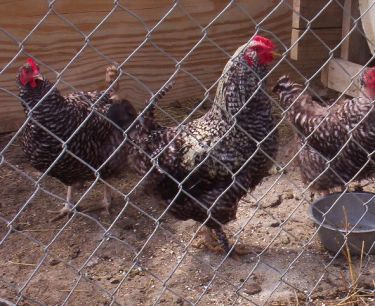
Ahhhhh, the Rooster. Did you know that the words "cocky", "strutten", "listen to him crow", "puffs out his chest", as well as other "old sayings" come from the fact that Roosters are proud and many times arrogant creatures. Some can be down right mean, only because they want to be at the "top of the pecking order", also another chicken term.
You do not need a Rooster if all you want are the eggs. But if you want to raise your own chicks, if you want that early wake up crow or the ambiance around your farm, you will need a Rooster.
more to come on Roosters
The contents of this page for Chickens is still under construction. Please check back later! If you decide to buy and own chickens please do read up and do your research on them. Chickens, like any animal, deserves the best care you can provide. Their needs are usually minimal, but should be met. There are a few medications you should always have on hand for your chickens. Correct Chicken Feeds are easy to find on the market. Please buy a few books and or do some Internet reading before acquiring your chickens.
HOUSE CHICKENS AS PETS
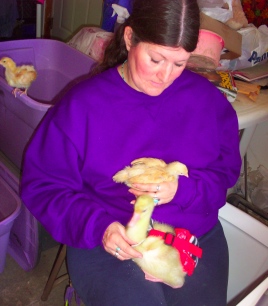
Yes! It has becoming more and more and more popular. People are keeping chickens in their homes as pets wearing diapers.
It sounds like a fun thing to do, have a big bird in a diaper in your home (goose or chicken or duck or turkey or) and it is becoming more and more popular. But when you bring a goose or chicken or duck into the home there is a lot that one should ask themselves. Like a dog a chicken lives a long life, longer then a hamster for sure. It is quite a commitment to the bird. It is not fair to the animal to live it's first year or first few months in your home with you making a fuss over it and they stick it outdoors with other animals that might not like it and may pick on and or at it.
Before bringing a chicken into your home as a pet you should ask yourself if you are ready for the mess, the smell, the diapers, with chickens usually a sanitary napkin (they are not cheap even when cut in half) as well as sharing your rooms with a big bird that *will* shake the water everywhere. Do you have a place for the mess when they eat? Do other members of your household think a chicken, a roosting and flying around your home is a good idea? Are you ready to train a chicken that it is not allowed to pull stuff off your desk and table and.....? It is just like getting a cat or a dog or a hamster, be prepared and set up for the animal and remember you are making a commitment.
It can be fun and you can buy or make outfits and costumes for them. And yes, they will lay eggs indoors.
Photo is of me with our house goose Eden, wearing a diaper holder, on my lap, Ellie April, our Buff Orphington chick in my hand and another Buff O behind us...with three more in the purple tub.
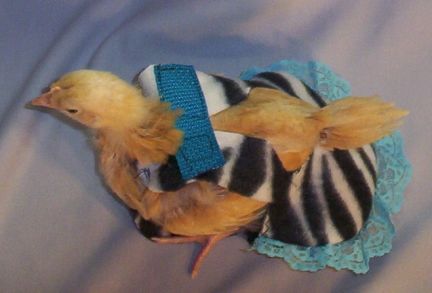
Yes, chicken really wear diapers with a harness that is called a Diaper Holder. The most important thing to remember is that the diaper holder needs to fit the bird correctly. It needs to fit snug but allow movement. And you have to line it with something. Most folks use sanitary pads and or baby diapers. Most chickens will not need any more then sanitary napkins.
Amazingly baby fowl, especially geese can use those beaks to "undo" things. Your diaper holder needs to close well enough that the bird wearing it can not open the closure. Chickens might be able to use velcro, geese will unfasten it and pull the diaper holder off and perhaps pull the diaper out. The fastener also needs to be safe, no sharp edges, nothing that might come off and choke your bird. Also remember that a shiny fastener will attract the birds attention and they will pick at it more then one that is not shiny. (no safety pins)
Baby Fowl grow quickly, so you will need several sizes of diaper holders. Many will be adjustable to a point, but you need to make sure, again, that the diaper hold fits well and holds the contents securely.
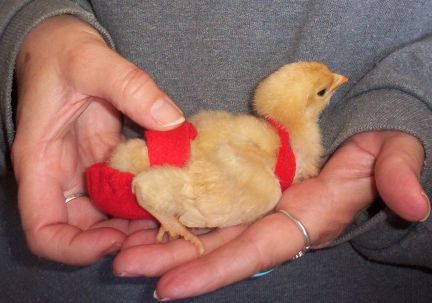
A chicken should not spend it's life in a Diaper Holder. You should have an area that your chicken can be wear the manure won't bother anything. At night your chicken should have it's own perch to sleep on where it dose not have to wear a diaper.
I do have a full page About Bird Diapers. Please take the time to read through it before you decide if Diapered Poultry is right for you and your household.
It does not matter what type of birds, or any animal, your own, you must keep them clean. Don't let manure pile up, it is not only unhealthy for the birds, but also people. If your chicken is in a Diaper Holder it needs to be changed often. It is not ok to buy a Diaper Holder with a large pouch and just leave the mess in there for hours.
You might be surprised at what you can train a chicken to do. You might also be disappointed. While you will be able to teach your chicken to come when called, follow you around, do a few tricks, you will not be able to train it go hold it's bowl movements. You will NOT be able to housebreak your chicken. You might be able to set up an area with perches where your chicken will want to be in often, and sleep there. This area could be where you chicken goes potty. But do not expect your chicken to run to that area to go potty. It won't. Your chicken does not have the muscles in it's rear end that it takes to be able to hold the urge.
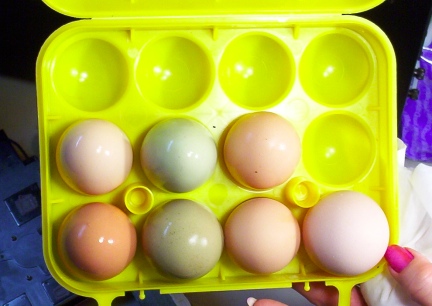
I do not know of any other pet that will have a piece of your breakfast for you many mornings a week. Yes, just because your chicken is an indoor pet does not mean that it will not lay an egg right on schedule most days. Read up on your breed of chicken to know how often your chicken might lay.
Did you know that chicken eggs come in many sizes and colors.
GREEN EGGS BLUE!
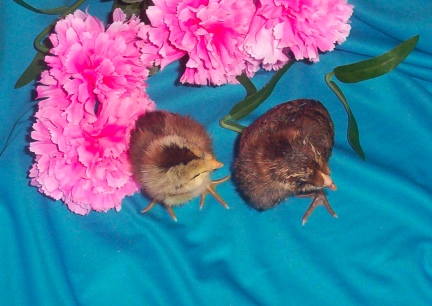
Deron and I bought Americanas Poulettes, just three, chicks, the Sporing of 2010. Araucanas are a breed of chicken that lay blue and green eggs, from turquoise to olive green. Easter Eggs with out the dye. The breed we bought was developed from the Arauconas. There is a third breed that lays the beautiful colored eggs called Easter Eggers, they are a Bantum Breed and I would love to own a few.
A week later Deron decided we needed a Americana Cock/Rooster....so we bought one. Now our green and or blue eggs will be or should be fertile. I think he might have selling fertile eggs and or putting some in the incubator in mind.
So when they start laying this fall, I am going to buy a bit of ham....yes, Green, and I am really hoping Blue, eggs and ham steaks!
| 



 In the high plains of South Dakota, USA
In the high plains of South Dakota, USA In the high plains of South Dakota, USA
In the high plains of South Dakota, USA